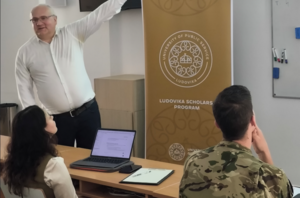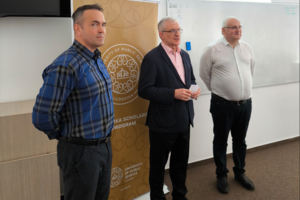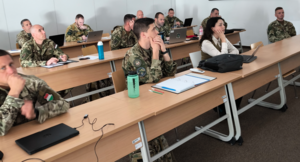The Ludovika University of Public Service had the honour of hosting Dr. Jānis Grasis, a distinguished professor from Riga Stradins University, as part of the Ludovika Scholars Program on April 29–30, 2025. During his visit, Professor Grasis delivered two highly acclaimed lectures at our institution. This academic exchange offered an excellent opportunity to strengthen scholarly cooperation between the Baltic states and Hungary, particularly in the areas of regional security challenges and international law.
On April 29, Professor Grasis delivered a comprehensive lecture to an audience of 14 Hungarian military officers holding the rank of major, along with additional invited guests. His presentation focused on the classical principles of international humanitarian law and the current violations occurring in the Baltic Sea region. He provided a detailed analysis of the historical development of the law of armed conflict, beginning with its foundations in the late 19th century, and placed particular emphasis on the significance of the Geneva Conventions (1864–1949) and the Hague Conventions (1899–1907). Dr. Grasis clearly distinguished between jus in bello and jus ad bellum, illustrating the application of international humanitarian law with numerous historical examples.
In the second part of his lecture, the professor addressed contemporary security challenges in the Baltic Sea region. He presented a detailed account of GPS disruptions affecting approximately 46,000 flights between summer 2023 and April 2024, highlighting the serious implications for civil aviation and the stability of regional security systems.
On April 30, Professor Grasis gave a second lecture at the Ludovika Campus Educational Building, jointly organized by the Puskás Tivadar and Security Policy Student Associations. This presentation examined the international and humanitarian legal dimensions of the Russia–Ukraine conflict. The professor offered a thorough analysis of the international legal assessment of acts of war, the practical application of humanitarian law, and the international community’s responses and options. In addition to discussing developments in the Russia–Ukraine conflict, he referenced numerous historical examples, including events from the Second World War histories of Latvia and Hungary, providing valuable historical context for the audience.
Professor Grasis’s lectures underscored that the Baltic Sea region and Central Europe face shared security challenges that require regional cooperation. He emphasized that instruments of hybrid warfare—such as GPS disruptions and infrastructure attacks—represent a new type of threat that transcends traditional military operations and calls for innovative approaches in both military strategy and the application of international legal norms.
This visit, facilitated by the Ludovika Scholars Program, further reflects our university’s commitment to expanding international professional networks and providing students with up-to-date, practice-oriented knowledge. Dr. Grasis’s lectures not only conveyed theoretical insights but also offered practical perspectives, helping students understand the intersections between international law and regional security in real-world conflicts.
Text and photo: Dr. Ferenc Petruska


